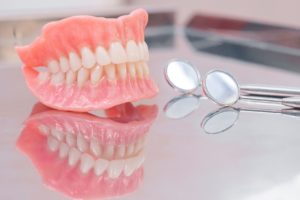
Dentures are the tried-and-true method to refurbish your smile after tooth loss because they enhance your daily quality of life by helping you eat and speak more normally. Without them in place, you wouldn’t be able to form words or chew your meals. That said, your dentures must fit well so that you can continue to enjoy the many benefits they provide. If yours are clicking or easily become dislodged, it may be time to have them repaired or replaced. Keep reading to learn about 4 additional consequences of poorly fitting dentures!
Consequence #1: Chafing
When you first received your replacement teeth, they fit like a glove and you grew accustomed to having them in your mouth. Many patients find that over time they even forget they’re wearing them! Unfortunately, your jawbone degrades over time and eventually, your dentures will no longer sit where they should. When this happens, they rub raw spots into your gums and the insides of your mouth. This can lead to painful blisters that can become infected and cause gum disease, which can enter your bloodstream and impact the rest of your body if left unaddressed.
Consequence #2: Challenges Speaking
Your ability to speak depends on how your tongue and mouth muscles move against your teeth. One of the greatest advantages of having false ones is that they restore your ability to have conversations after losing some or all of your pearly whites. Loose dentures, however, are prone to shifting in your mouth which makes speaking that much harder. You’ll get all tongue-tied trying to hold them down while forming sounds.
Consequence #3: Malnutrition
One of the main functions of your dentures is to help you chew food which is the very first step of the digestive process. If yours become dislocated when you bite down, something as simple as eating can become a real issue. You won’t be able to break your meal down into pieces small enough to be easily digested, which can lead to gastrointestinal problems. Furthermore, if you can’t eat solid foods anymore, you’ll have to switch to a liquid diet which doesn’t allow you to enjoy a full variety of nutrients.
Consequence #4: TMJ Problems
If your dentures keep sliding out of place, then you’re probably overworking your mouth and jaw muscles trying to get them to stay put. This overcompensation puts extra pressure on the joint that connects your jaw to your skull, known as the temporomandibular joint (TMJ). It’s not uncommon for this area to become inflamed leading to an aching face, headaches, and even a stiff or locked jaw.
If you’re experiencing these types of issues, call your dentist today. They’ll let you know whether your dentures can be mended or if you need new ones so that you can get back to life as usual!
About the Author
Dr. Ryan Johnson works tirelessly to ensure you receive the highest quality dental care possible. He earned his Doctor of Dental Surgery at the University of Colorado School of Dental Medicine and continues to hone his skills with ongoing educational opportunities. He provides a full array of oral health services, including dentures. If yours aren’t fitting as well as they used to, you’re welcome to request an appointment on the website or by calling (904) 895-4536.
